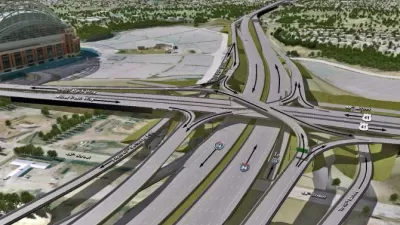It was always a risk that states would use funding from the federal Infrastructure Investment and Jobs Act to double down on the transportation systems that create congestion and air pollution.

“A $283 million boost in federal highway money that Wisconsin is getting from Washington got approval from the Legislature’s budget committee Tuesday, but only after the Republican majority rewrote some of the spending plan for the new funds,” reports Erik Gunn for the Wisconsin Examiner.
“The money comes to the state as a result of the federal [Infrastructure Investment and Jobs Act] enacted in late 2021 and the 2022 federal appropriations bill that followed this March,” adds Gunn to explain the state’s largesse.
The reasoning behind the Republican rewrite of the spending plan is worth paying attention for planners and advocates hoping to fund and complete projects proven to reduce automobile trips, reduce congestion, and reduce air pollution from combustion engines. The original plan for the $283 million, proposed by the Wisconsin Department of Transportation (WisDOT), devoted $4.3 million of the funding to the state’s Congestion Mitigation and Air Quality Improvement program (CMAQ). The changes implemented by Republican committee members, however, ensure that the CMAQ funding won’t be spent on bicycle, pedestrian, or trail facilities.
The WisDOT is limited to spending CMAG funds in non-attainment and maintenance counties (i.e., high air pollution areas, as defined by federal law) in southeastern and northeastern Wisconsin—Milwaukee, Racine, Kenosha, Waukesha, Washington, Ozaukee, Walworth, Sheboygan, Kewaunee, Manitowoc, and Door—so the funding changes deliver a blow to plans in the locations that need non-polluting transportation projects the most.
FULL STORY: Finance committee gives OK to most of state’s plan for extra federal highway money

Study: Maui’s Plan to Convert Vacation Rentals to Long-Term Housing Could Cause Nearly $1 Billion Economic Loss
The plan would reduce visitor accommodation by 25,% resulting in 1,900 jobs lost.

North Texas Transit Leaders Tout Benefits of TOD for Growing Region
At a summit focused on transit-oriented development, policymakers discussed how North Texas’ expanded light rail system can serve as a tool for economic growth.

Alabama: Trump Terminates Settlements for Black Communities Harmed By Raw Sewage
Trump deemed the landmark civil rights agreement “illegal DEI and environmental justice policy.”

How Community Science Connects People, Parks, and Biodiversity
Community science engages people of all backgrounds in documenting local biodiversity, strengthening connections to nature, and contributing to global efforts like the City Nature Challenge to build a more inclusive and resilient future.

Alabama: Trump Terminates Settlements for Black Communities Harmed By Raw Sewage
Trump deemed the landmark civil rights agreement “illegal DEI and environmental justice policy.”

Dear Tesla Driver: “It’s not You, It’s Him.”
Amidst a booming bumper sticker industry, one writer offers solace to those asking, “Does this car make me look fascist?”
Urban Design for Planners 1: Software Tools
This six-course series explores essential urban design concepts using open source software and equips planners with the tools they need to participate fully in the urban design process.
Planning for Universal Design
Learn the tools for implementing Universal Design in planning regulations.
City of Santa Clarita
Ascent Environmental
Institute for Housing and Urban Development Studies (IHS)
City of Grandview
Harvard GSD Executive Education
Toledo-Lucas County Plan Commissions
Salt Lake City
NYU Wagner Graduate School of Public Service





























